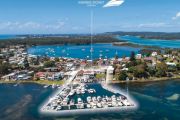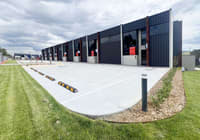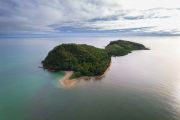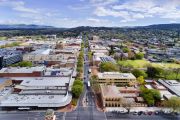
Treasury sells Karadoc winery near Mildura to wool brokers
Treasury Wine Estates has sold its Karadoc winery near Mildura in Northern Victoria to two South Australian businessmen with interests in the wool industry, who will convert it into a storage and logistics hub.
The ASX-listed wine giant announced in July last year that it would shut the five-decade-old commercial winery, which produced brands like Wolf Blass and Yellowglen, as part of a strategy to focus on the more premium and profitable end of the wine market.

A spokeswoman for TWE confirmed the winery had been purchased by Karadoc Logistics Hub, and will be used as a “strategic storage and logistics hub for the Sunraysia region and surrounding areas”.
“Using the existing tanks and warehouse on the site, the facility will continue to provide storage services to TWE following the sale. The transaction is expected to be completed by October 11, 2024.”
Karadoc Logistics Hub is jointly owned and directed by Troy Harrington and Mark Dyson. Mr Dyson is the managing director of family-owned Quality Wool Group, one of the country’s largest wool brokers.
Mr Harrington is the chief financial officer of Quality Wool Group.
TWE has previously not disclosed the value of the Karadoc winery. A spokeswoman declined to comment on the sale price.
TWE’s 2024 Annual Report values “assets and disposable groups held for sale” at $13.6 million.
In its latest monthly property report, valuers Herron Todd White said Karadoc’s sale price “will represent a fraction of the facility’s replacement cost”.
Explaining the decision to close down the country’s fourth-largest winery (with a production capacity of 100,000 tonnes), Treasury Wine chief supply officer Kerrin Petty said in July last year that the wine industry was seeing consumers shift away from commercial wine, referring to wine sold at under $10 per bottle.
“Over the coming years, we expect commercial volumes at Karadoc to continue to decline and volumes to be at around 60 per cent of the capacity that the site is built to process. Given 70 per cent of costs at Karadoc are fixed, processing less volume means the cost of running the site is substantially higher,” Mr Petty said.
The Karadoc winery opened in 1973 and was one of four major production facilities operated by Southcorp, the producer of Penfolds, which was acquired by Foster’s Group in 2005 and later spun out as Treasury Wine.
Alongside the sale of Karadoc winery, TWE has also been selling off vineyards providing fruit for its commercial brands. In February, the world’s largest manager of farmland assets, Nuveen Natural Capital acquired TWE’s 552-hectare Heathcote vineyard portfolio near Corop – about 60 kilometres north-west of Bendigo – for just over $14 million.
“We’re always reviewing our assets to ensure we are set up in the best way to support our strategic priorities, and right now that means a focus on our luxury-led strategy,” Mr Petty said following the sale of Karadoc.
“There has been an ongoing shift away from commercial wines in Australia and around the world, and the sale of Karadoc follows a recent announcement of TWE’s plans to divest its commercial brand portfolio, including Wolf Blass, Yellowglen, Lindeman’s and Blossom Hill,” he added.
Coonawarra estate up for sale
Also in South Australia, the highly regarded Penley Estate in the Coonawarra has been listed for sale by Ang and Bec Tolley, descendants of the Tolley and Penfold winemaking families.
The sisters – the daughters of Reginald Lester Tolley and Judith Anne Penfold Hyland – started their vineyard on a plot of land in the Coonawarra that they bought in the late 1980s. They planted cabernet and shiraz grapes and then built a winery in 1995.
It’s now being offered as a complete and established wine business by Tim Altschwager and Nick Goode from Colliers.

Penley spans 119 hectares and includes about 86 hectares of vineyards planted with signature Coonawarra varietals. There’s also a grand estate with a stone-walled entrance, a cellar door, fully equipped winery, barrel store and weighbridge and office.
The offering also includes more than 210 megalitres of water entitlements, a manager’s residence with landscaped gardens, and a separate cottage.










